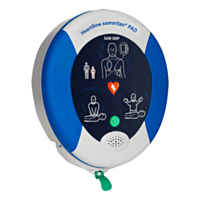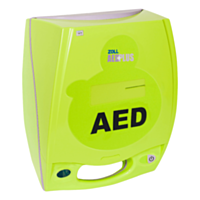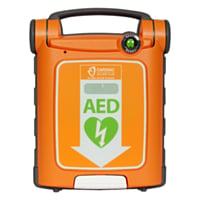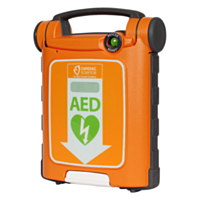Defibrillator with CPR feedback
Importance of defibrillators and high-quality CPR in cardiac arrest emergency
When it comes to a sudden cardiac arrest emergency, time is critical, and prompt and effective actions can significantly increase the victim's chances of survival. Two essentials in this type of emergency are using a defibrillator and providing high-quality CPR.
Defibrillators in public places
A defibrillator is a device that delivers an electric shock to the heart to restore its normal rhythm. Automated External Defibrillators (AEDs) are portable, easy to use, and widely available in public places such as airports, shopping centres, and sports stadiums. The availability of defibrillators in public places has helped save many lives.
Voice prompts and metronome clicks
Most defibrillators come equipped with voice prompts that guide the rescuer through each step of the rescue process, including when to start performing CPR. Additionally, an audible metronome function can help the rescuer maintain a consistent rhythm while administering chest compressions. These features are especially helpful in high-stress situations, allowing the rescuer to focus on providing effective care to the victim of sudden cardiac arrest.
Importance of CPR feedback
CPR feedback is a feature of some defibrillators on the market today that provides real-time analysis of the quality of chest compressions administered by the rescuer during a cardiac arrest event. It is essential to note that CPR feedback is not the same as CPR instruction or guidance.
The main goal of CPR feedback
The main goal of CPR feedback is to prompt, guide, and provide confidence to the rescuer in a highly stressful situation. By providing audio or visual cues that prompt the rescuer to adjust their technique and improve the effectiveness of their CPR. CPR feedback can help increase the chances of survival for a cardiac arrest victim. Whether the rescuer is a trained professional or an untrained bystander, CPR feedback can help settle the nerves of the rescuer and provide high-quality CPR.
Defibrillators with CPR feedback
Defibrillators with CPR feedback are valuable for improving the quality of CPR delivered during sudden cardiac arrest emergencies. Here is a table comparing some of the most popular defibrillators on the market that come equipped with CPR feedback:
| Defibrillator Model | CPR Feedback Features |
| Heartsine Samaritan Pad 500P | Real-time feedback instructions, communicating verbal instructions such as “Good Compressions”, “Push Harder,” “Push Faster” and “Push Slower” |
| Zoll AED Plus | Real-time feedback on depth and rate of compressions, as well as audio and visual prompts for when to start and stop compressions |
| Cardiac Science Powerheart G5 | Real-time feedback on depth and rate of compressions, as well as guidance on hand placement and the ability to adjust feedback based on patient size |
These defibrillators provide crucial feedback to rescuers, helping them to perform high-quality CPR and improve the chances of survival for the victim of sudden cardiac arrest. Browse our selection of defibrillators with CPR feedback.
CPR feedback pads
The CPR feedback pads work seamlessly with defibrillators with CPR feedback. They have a self-adhesive design for easy placement on the patient's chest and provide the highest quality chest compressions during CPR. With clear diagrams and instructions, even non-professionals can use them effectively. The electrode pads are of the highest quality, with a long shelf life and high conductivity, ensuring optimal performance when needed. Bottom of Form



